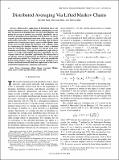Distributed Averaging Via Lifted Markov Chains
Author(s)
Jung, Kyomin; Shah, Devavrat; Shin, Jinwoo
DownloadShah_Distributed averaging.pdf (424.0Kb)
PUBLISHER_POLICY
Publisher Policy
Article is made available in accordance with the publisher's policy and may be subject to US copyright law. Please refer to the publisher's site for terms of use.
Terms of use
Metadata
Show full item recordAbstract
Motivated by applications of distributed linear estimation, distributed control, and distributed optimization, we consider the question of designing linear iterative algorithms for computing the average of numbers in a network. Specifically, our interest is in designing such an algorithm with the fastest rate of convergence given the topological constraints of the network. As the main result of this paper, we design an algorithm with the fastest possible rate of convergence using a nonreversible Markov chain on the given network graph. We construct such a Markov chain by transforming the standard Markov chain, which is obtained using the Metropolis-Hastings method. We call this novel transformation pseudo-lifting. We apply our method to graphs with geometry, or graphs with doubling dimension. Specifically, the convergence time of our algorithm (equivalently, the mixing time of our Markov chain) is proportional to the diameter of the network graph and hence optimal. As a byproduct, our result provides the fastest mixing Markov chain given the network topological constraints, and should naturally find their applications in the context of distributed optimization, estimation and control.
Date issued
2009-12Department
Massachusetts Institute of Technology. Department of Electrical Engineering and Computer Science; Massachusetts Institute of Technology. Laboratory for Information and Decision SystemsJournal
IEEE Transactions on Information Theory
Publisher
Institute of Electrical and Electronics Engineers (IEEE)
Citation
Jung, Kyomin, Devavrat Shah, and Jinwoo Shin. “Distributed Averaging Via Lifted Markov Chains.” IEEE Transactions on Information Theory 56.1 (2010): 634–647. © Copyright 2009 IEEE
Version: Final published version
ISSN
0018-9448
1557-9654